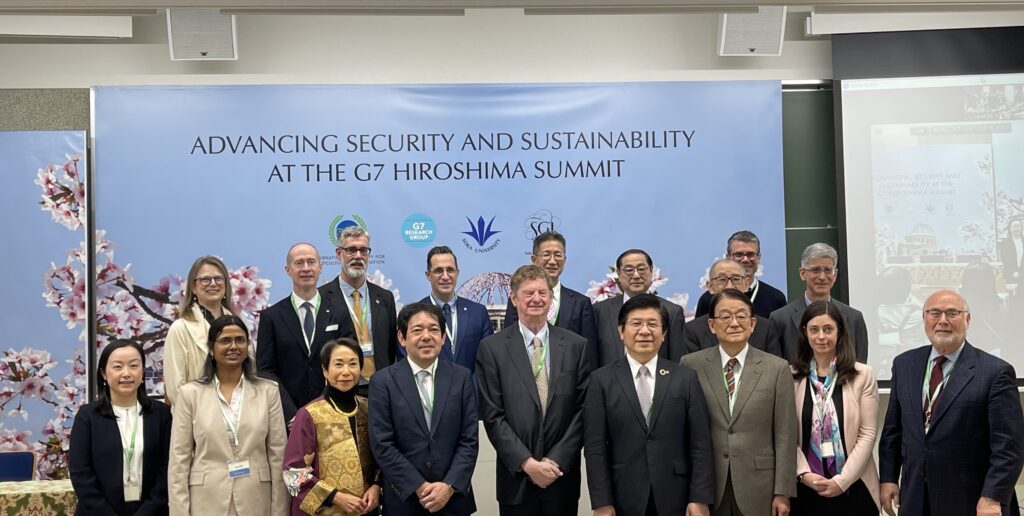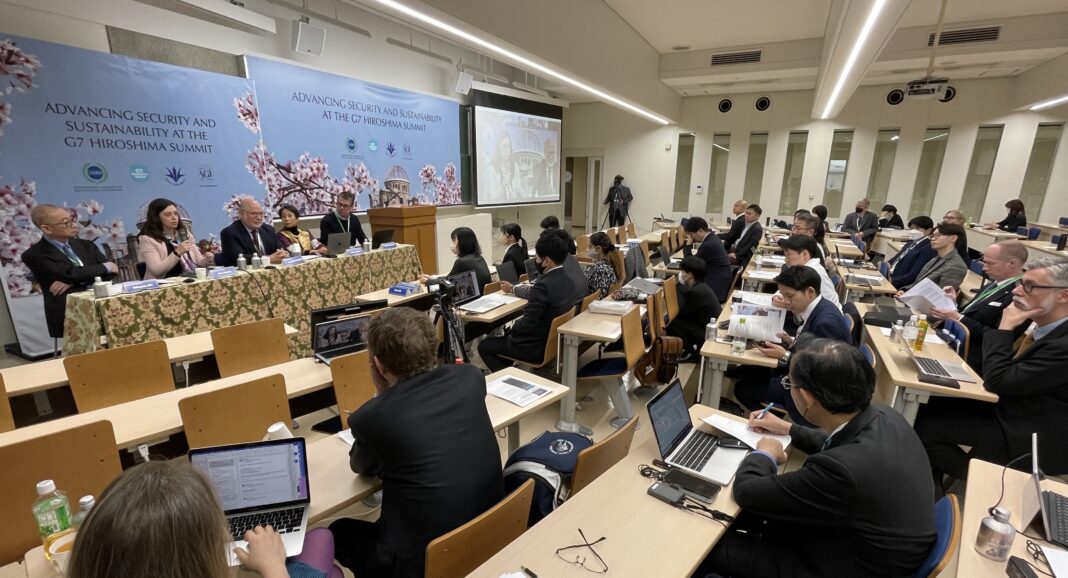By Kalinga Seneviratne
SYDNEY | TOKYO, 3 April 2023 (IDN) — Addressing a live-streamed conference held at Soka University in Tokyo on 29 March in preparation for the G7 summit in May, which Japan hosts, Takashi Ariyoshi, Deputy Secretary General of the G7 Hiroshima Summit Secretariat said that Prime Minister Fumio Kishida had put high priority to include nuclear disarmament in the agenda of the summit. (P01) ARABIC | JAPANESE | NORWEGIAN | PORTUGUESE | SPANISH
He pointed out that the venue of the conference, the Japanese city of Hiroshima, Prime Minister Kishida’s hometown, where the United States dropped a nuclear bomb at the end of the second world war (on 6 August 1945)—killing about 140,000 people—symbolizes the unprecedented challenge atomic weapons pose to humanity.
“G7 will deepen discussion and send a strong message to link the idea of a world without nuclear weapons (amid) the harsh reality we face today with the security environment,” he said, adding: “There are a lot of ways to tackle this issue”.
He listed three ways the G7 discussions may focus upon. One is a “shared recognition” of the non-use of nuclear weapons. The second will be transparency in atomic weapon policies, and the third is to secure a reduction of nuclear weapons stockpiles and promote the peaceful use of atomic energy.
John Kirton, Director, G7 Research Group—a co-sponsor of the event—told the audience that it is significant the G7 summit is held this year in Hiroshima when the world is threatened with the use of nuclear weapons, particularly by Russia. “This site is important to remind G7 leaders of the horrors of nuclear war,” he noted. “We must look at our conduct, and we need to work towards the benefits for all (of disarmament policies)”.
G7—The Group of Seven—include Canada, France, Germany, Italy, Japan, the United Kingdom and the United States.
Addressing a special panel on controlling nuclear weapons, Anna Ikeda, Representative to the United Nations of Soka Gakkai International, argued that the Hiroshima G7 summit provides an opportunity to think about our security seriously. “Nuclear weapons cannot be the means for achieving national security,” Ikeda declared. “We must detoxify ourselves from current nuclear-dependent security doctrines.” SGI was also a co-sponsor of the event.
She argued that if all nuclear states adopt the “no first use” principle, it will provide space for multilateral dialogue to help resolve the Ukraine conflict. “Such policies must be accompanied by policies to build mutual trust,” she added.

Participants of a one-day international conference titled ‘Advancing Security and Sustainability at the G7 Hiroshima Summit’ held at Soka University on 29 March 2023. Photo: Katsuhiro Asagiri, Multimedia Director of IDN-INPS.
Noting that each G7 state’s nuclear statistics are in violation of the Treaty of Non-Proliferation of Nuclear Weapons (NPT), Audrey Kitagawa, President of the International Academy for Multicultural Cooperation (IAMC)—another co-sponsor of the conference—stressed the need for the G7 summit to raise the nuclear issue to the highest level and demand more attention to eliminate nuclear weapons. If not, she warned that nuclear weapon countries would soon increase.
“We may have ten nuclear weapons states soon when Iran has it, and Saudi Arabia may join. South Korea may also join or ask America to install them there,” she noted, and warned that “China and the US are increasing their nuclear weapon budgets. (Thus) nuclear states are contributing to greater insecurity we are seeing today”.
The NPT is a landmark international treaty that aims to prevent the spread of nuclear weapons and weapons technologies. One hundred ninety-one states, including five nuclear weapon states, have signed it.
“Members of the nuclear club pose the biggest damper to security,” Kitagawa said. “No first use of nuclear weapons is a first step (to reduce tension); only China and India have given that undertaking.”
“The US response to the rise of China is adding to tension and arms race in Asia,” noted Rorry Daniels, managing director of Asia Society Policy Institute. To reverse this trend, she said that a better definition of cooperation is to work on common interests. She pointed out that China and the US worked together earlier in nuclear research to treat cancer and to reduce the danger of enriched uranium.
Instead, as Jonathan Granoff, President of the Global Security Institute, noted, “we are creating devices that would end all best human endeavours”. He pointed out, “we know ‘good’ countries that do horrible things (to human beings)” and gave examples of Iraq, Hiroshima, Syria, Sudan and Ukraine. He also drew attention to what happened to some countries that gave up nuclear weapons, such as Libya, Ukraine and Iraq.
“We allow no country to use smallpox as a bio-weapon but will allow nine countries to use plague as a bio-weapon. That is what we have with nuclear weapons,” declared Granoff. He urged that the G7 meeting in Hiroshima take the first steps to pledge “no first use of nuclear weapons” into a legally binding international treaty, perhaps adopted via the UN Security Council.
“In the US, when we activists ask for nuclear disarmament, we are told the other side don’t want to do it,” explained Granoff. “At the Hiroshima summit (everyone) must be told that nuclear weapons have to be eliminated for us to have security.”
To ensure that we eliminate nuclear weapons before we destroy ourselves, Ikeda said, we need to change the narrative that nuclear weapons keep us safe. “We need to confront ways of thinking that justify nuclear weapons. We need to say, avoiding nuclear weapons is the way (to peace),” she argued. “Hiroshima (G7 summit) must set a deadline and pathway towards it.” [IDN-InDepthNews]
Related article: G7 Research Conference Held at Soka University




